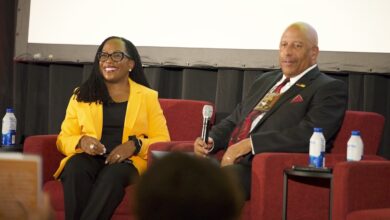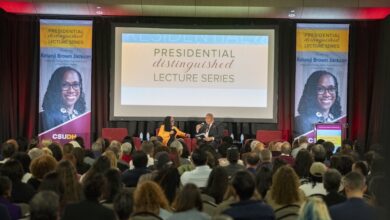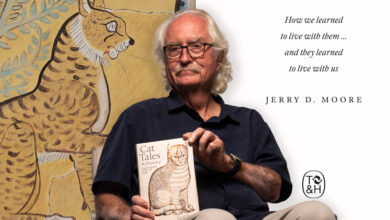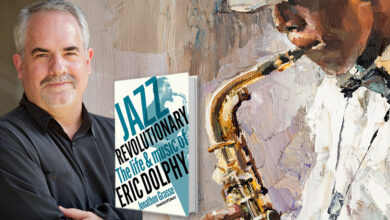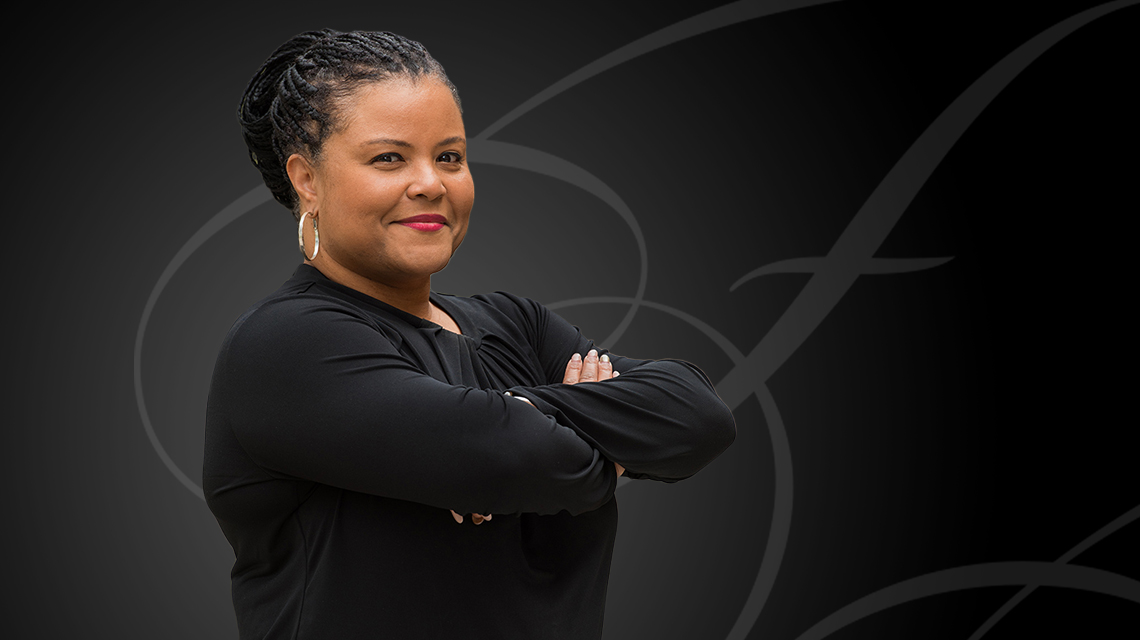
Donna Nicol, associate professor and department chair of Africana Studies, has a personal connection to CSUDH. “I grew up nearby, and my mother went to Dominguez Hills,” says Nicol. “My first job out of college was also at CSUDH. It’s been a staple in my life.”
Nicol says that after working for a decade as an assistant/associate professor in women’s and gender studies at CSU Fullerton, getting the position at CSUDH “felt like I was coming home.”
Nicol has been a vibrant, vocal presence on campus since her return. Her work helping to revive the Africana Studies department, spirited support of ethnic studies efforts, and efforts co-chairing the CSUDH Anti-Racism Task Force have helped her earn the 2021 Excellence in Service Award. The honor recognizes faculty contributions to university governance and development and acknowledges that service and partnership are an essential component of CSUDH’s mission.
When Nicol arrived on the CSUDH campus in 2017, she took over as chair of a department that faced several challenges, including dwindling enrollment and low visibility on and off campus.
“There had been very little stability in the department for a number of years due in part to the heavy administrative turnover in our college and university in general,” says Nicol. “I was brought in to help revive it. Africana Studies enrollment had dropped pretty precipitously since 2010.”
Nicol oversaw a major overhaul of the Africana Studies B.A. degree. “When I came in, the program was hard for students to navigate and there was very little curricular coherence to the requirements. It made no sense to me, so I know it made no sense to the students.” She spearheaded the lengthy program modification process, which resulted in a new 36-unit Africana Studies B.A. program that is more focused and dynamic.
As chair, Nicol is “the queen of self-promotion,” she laughs. “It’s important that our faculty tell their own stories. I have no shame in telling people that our department is doing all these amazing things for our students and with our scholarship. I’m really trying to raise the profile of the department and CSUDH.”
Ethnic Studies and Anti-Racism
Nicol has also been a vocal proponent of expanded ethnic studies in the CSU and worked in support of Assembly Bill 1460 (AB1460) as a member of the CSU Ethnic Studies Council. The bill, which added an ethnic studies requirement to all CSUs, was signed into law by Gov. Gavin Newsom in August 2020.
“I have been very vocal in support of AB 1460 and have been actively engaged in that work since I’ve been at CSUDH” she says. “Once it passed, I helped conceptualize the creation of the Ethnic Studies Implementation Committee for our campus.”
Nicol has also been sharing her message outside the campus, appearing at speaking engagements as an ethnic studies scholar. She recently spoke at CSU Channel Islands as part of their Ethnic Studies Speakers Series. “We’re doing more cross-collaborations, and are ramping up systemwide programming, so we can share the work that we’re doing instead of just keeping it in-house.”
For the past year, Nicol has also been serving as co-chair of the Anti-Racism Task Force. Created in the wake of the George Floyd murder and ensuing protests, they have been tasked with examining how the university is working to combat anti-black racism and suggesting ways in which CSUDH can more closely live up to its social justice ideals.
“Right now, we’re engaged in a campus-wide survey,” says Nicol. “Then we’re going to use that survey to create focus groups to find out people’s buy-in to the list of demands that Africana Studies has put together. We want to present some of them as recommendations to the cabinet, but we want to get some stakeholder feedback before we do all of that. It’s been a longer process than we had anticipated.”
Nicol is optimistic that the task force will be a catalyst for substantive change and welcomes the increased openness about race and racism that the last year has brought. “People are being more mindful that we need to have conversations about race, ethnicity, gender, and other forms of diversity on our campus.”
However, she cautions, “I think one of the problems on campus is that folks tend to think that since we’re serving these black and brown kids, diversity automatically has occurred. But diversity, if you want to call it that, has to be intentional. Anti-racism must be an intentional, ongoing process. What the task force is trying to do is to give the president’s cabinet a blueprint for what is the priority in terms of these race and ethnicity issues.”
Connecting with the Community
It’s Nicol’s personal connections to the university and the community that make working at CSUDH so special for her. “I think what was really motivating me to come back is that there’s a real opportunity to work with these students who have all of this potential and just need someone to actually give a damn. Someone to care about their well-being academically and emotionally. Dominguez provides that opportunity.”
As chair of Africana Studies, Nicol says that “It is my hope that before I retire, we create an Institute of Black Los Angeles. It would be a repository for the history of Black L.A., and an ongoing preservation of Black L.A.’s history. I have a vision in my head. This is the mark I want to leave for DH, because I think the university is positioned quite well to do that.”
Nicol believes that CSUDH’s acquisition of the Mamie Clayton Collection of African American History and Culture, and establishment of the Georgia and Nolan Payton Archive of Sacred Music are steps in the right direction. “Those collections are going to contribute to having a vibrant academic community on our campus.”
For now, Nicol continues to reach out and build relationships with the community. “I don’t feel that CSUDH is doing enough in terms of its community engagement,” she says. “We should have more partnerships with community organizations around the campus and do more in the City of Carson. Part of the reason I came back is so I could facilitate that, because I know the folks in the community.”
It is for this reason she has organized Rides to the Polls for CSUDH students and staff in 2018, a Virtual Voter Education and Mobilization Forum in 2020, a community webinar on domestic violence in the African American community, in addition to facilitating workshops on implicit bias, understanding Black Lives Matter, and upending anti-black racism for area non-profit organizations and schools.
“In order to build these partnerships in the community, you really need to have people who are from the community, who can communicate what they need while balancing the interests of the institution,” says Nicol. “A lot of my service is to let people know, ‘Hey, there are scholars at Dominguez Hills’ who have expertise that can be of service and value to the community.”

